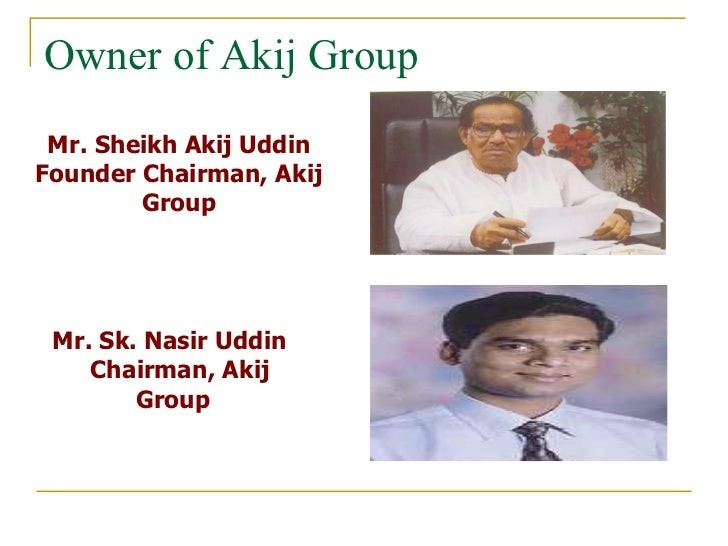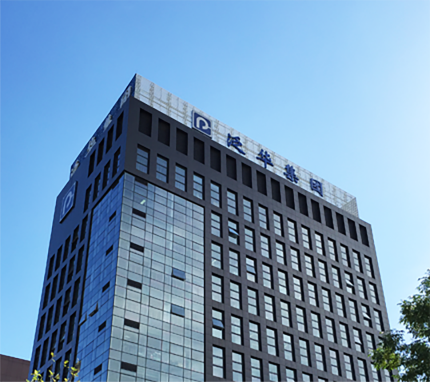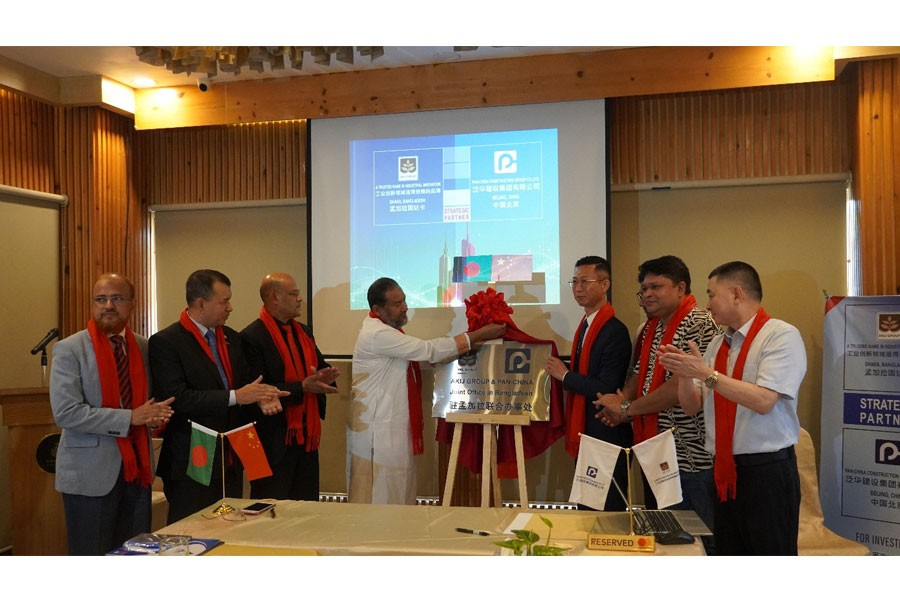1. Introduction
In a fast-changing global business world, partnerships between companies from different countries have become a powerful way to grow, share knowledge, and reach new markets. The collaboration between Bangladesh’s Akij Group and China’s Pan-China Construction Group comes as one such.
To collaborate on upcoming business initiatives, these two significant corporations signed a Memorandum of Understanding (MoU). This partnership, marked by a Memorandum of Understanding (MoU), signals a strategic move by both entities to leverage their respective strengths and expand their business horizons.
The history of both businesses, the rationale behind their partnership, and the potential implications for business development in Bangladesh are all examined in this study. It also explains why cross-border business cooperation is important in today’s economy and what this partnership aims to achieve.
1.1 Background of Akij Group as a Bangladeshi Conglomerate:

In Bangladesh, Akij Group is among the biggest and most varied corporations. Founded by Sheikh Akij Uddin in the 1940s, the group initially started with a jute trading business and later expanded into various sectors, contributing significantly to the Bangladeshi economy. Over decades, the Akij Group has made a significant impact on sectors like:
- Textiles: Manufacturing and processing of fabrics and garments.
- Tobacco: Production of cigarettes (though the tobacco division was sold in 2018 to JTI in the largest ever single foreign direct investment in Bangladesh).
- Food and Beverage: Manufacturing a large variety of food and drink items.
- Cement: The production of cement for building applications.
- Ceramics: Production of tiles and sanitaryware.
- Pharmaceuticals: Manufacturing and distribution of pharmaceutical products.
- Printing and Packaging: Providing printing and packaging solutions.
- Consumer Products: Offering various household and personal care items.
Akij Group is known for its commitment to quality and innovation, becoming a household name in Bangladesh. The group has also demonstrated its financial strength by being a significant contributor to the national exchequer, even being the highest taxpayer in Bangladesh in 2009. With the goal of dominating global markets, Akij Group is always looking for ways to grow and expand.

Summarizing key facts about Akij Group:
| Founded | 1940 |
|---|---|
| Founder | Sheikh Akij Uddin |
| Headquarters | Dhaka, Bangladesh |
| Key Industries | Textiles, Food & Beverage, Cement, Ceramics, Pharmaceuticals |
| Employee Strength | Over 32,000 (as of some reports) |
| Website | www.akij.net |
1.2 Overview of Pan-China Construction Group:

Pan-China Construction Group Co., Ltd. is a well-known Chinese company that works on construction and infrastructure projects. It focuses on urban development, industrial zones, and smart cities. The company has experience working in many countries under the Belt and Road Initiative (BRI), a global development strategy led by China.
Pan-China Construction Group has many smaller companies and works together with other businesses through joint ventures. It hires a large number of skilled workers from different fields. Their expertise covers:
- Urban Development: Investment, development, and construction of urban infrastructure.
- Urban Construction: Providing system solutions for urban development and construction services.
- Civil Engineering: Undertaking various civil engineering projects.
- Overseas Development: extending their business and working on projects abroad.
Pan-China Construction Group aims to be a leader in the innovation of China’s new urbanization, focusing on smart city development and providing integrated solutions for urban infrastructure.
Summarizing key facts about Pan-China Construction Group:
| Founded | 1993 |
|---|---|
| Origin | Under the former Ministry of Construction, China |
| Headquarters | China |
| Core Businesses | Urban Development, Urban Construction, Civil Engineering |
| Certifications | ISO9000, ISO14000, OHSAS18000 |
| Subsidiaries/JVs | Over 80 |
| Website | Pan-China Group |
1.3 Rationale for Cross-Border Corporate Collaborations
In the modern world, cross-border business partnerships are very important. When companies from different countries work together, they can:
-
Share technology and innovation
-
Access new markets and customers
-
Reduce risks through shared investment
-
Learn from each other’s expertise
-
Create jobs and local development
For a growing economy like Bangladesh, partnerships with foreign companies like Pan-China bring new ideas, investments, and industrial strength. On the other hand, Chinese firms benefit by entering South Asian markets with huge growth potential.
The signing of the MoU between Akij Group and Pan-China is a result of these global needs. It reflects the mutual interest in joint industrial development, possibly including the building of smart cities, economic zones, or new manufacturing hubs in Bangladesh.
Objectives of the Research
This research aims to explore the meaning and potential of the new business collaboration between Akij Group and Pan-China Construction Group. It will try to answer key questions about how this partnership could bring change not just for the companies, but for Bangladesh’s industrial future.
Key Objectives:
-
To understand the business reasons behind the MoU.
-
To examine the expected benefits and risks of this collaboration.
-
To explore the possible economic and social impact in Bangladesh.
-
To provide recommendations for how such collaborations can succeed.
2. Understanding the Memorandum of Understanding (MoU) Between Akij Group and Pan-China Group
A Memorandum of Understanding (MoU) is essentially a formal agreement between two or more parties. It signifies a shared intention to work together towards a common goal. While it’s not always legally binding in the same way a contract might be, it outlines the agreed-upon principles, objectives, and the general framework for the intended collaboration. Think of it as a roadmap that sets the stage for potential future contracts or agreements.
2.1 What is a Memorandum of Understanding (MoU)?
A Memorandum of Understanding (MoU) is an official but non-binding agreement between two parties. It outlines shared intentions and a plan of action before forming a full contract. MoUs are commonly used for:
-
Defining general objectives and areas of cooperation
-
Showing commitment from both parties
-
Offering a framework to negotiate detailed terms later
In this case, the MoU between Akij Group and Pan‑China Construction Group signals their desire to join forces in future business ventures in Bangladesh.
2.2 Key Highlights of the Akij–Pan‑China MoU
On June 2, 2025, the two companies signed an MoU during a high-profile event in Dhaka’s Baridhara Diplomatic Zone.

Here are the important details:
| Highlight | Details |
|---|---|
| Date & Venue | June 2, 2025 – Baridhara, Dhaka |
| Signatories | Sk. Amin Uddin (Akij) & David Liu Xian Wei (Pan‑China) |
| Attendees | Officials from FBCCI, BIDA, government ministries, plus business dignitaries |
| Purpose | To develop and invest in mega projects in sectors like industrial parks, smart cities, and infrastructure |
This event showcased the strong interest from trade bodies, government agencies, and banking and legal firms, signaling widespread support for the collaboration
2.3 Areas of Potential Business Collaboration
The MoU hints at four main areas where Akij Group and Pan‑China may work together:
-
Industrial & Special Economic Zones
Building large-scale industrial parks and special zones using global standards. -
Smart City & Urban Infrastructure
Joint development of smart communities, eco-friendly housing, waste management, and transportation systems. -
Logistics & Export Facilities
Creating modern logistic hubs and export centers to boost Bangladesh’s manufacturing and trade capabilities. -
Funding & Project Planning
Preparing business proposals and securing funding for visionary or large-scale developments
This broad cooperation could shape future industrial growth and infrastructure renewal in Bangladesh.
2.4 Role of Trade Bodies: FBCCI & BIDA
Trade bodies in Bangladesh play a crucial facilitation and advisory role:
-
FBCCI (Federation of Bangladesh Chambers of Commerce & Industries)
The country’s main private sector representative. FBCCI often helps connect Bangladeshi and Chinese organizations and participates in formal trade talks -
BIDA (Bangladesh Investment Development Authority)
Responsible for attracting and supporting foreign investment. BIDA works alongside bodies like the Bangladesh–China Chamber of Commerce to simplify permissions and reduce delays in visas, land leases, and utilities .
At the MoU event, high-level officials from both FBCCI and BIDA were present, underlining their commitment to supporting the collaboration
Read More: Akij Group: A Journey of Business Diversification and Growth in Bangladesh’s Economy
2.5 Risks and Limitations of MoU-Based Collaborations
While an MoU is a useful starting point, it comes with some risks:
-
Not Legally Binding: Either party can pull out anytime, which may delay progress.
-
Unclear Roles: If duties are not clearly defined, confusion or conflict can occur.
-
Financial & Legal Challenges: Costly projects, delays in approval, or policy changes can affect success.
-
Cultural Differences: Business styles in Bangladesh and China may differ, causing misunderstandings.
3. Economic and Infrastructural Impact Assessment
3.1 Economic Impact
The collaboration between Akij Group and Pan-China Construction Group can bring notable economic benefits:
-
Increased Investment: Joint projects may attract foreign investment, boosting Bangladesh’s capital inflow and supporting local industries.
-
Job Creation: Large-scale construction, such as industrial zones, smart cities, and infrastructure, will create thousands of jobs, from skilled engineers to construction workers.
-
Higher GDP Growth: Similar Chinese-backed projects like the Padma Bridge added around 1 – 1.5% to Bangladesh’s GDP
-
Trade Enhancement: Improved infrastructure, especially in logistics and export zones, can reduce transport costs and time, making Bangladeshi products more competitive .
3.2 Infrastructural Impact
Infrastructure development is a direct outcome of the MoU collaboration:
| Area | Expected Benefits |
|---|---|
| Transport & Logistics | Better roads and industrial parks for faster cargo handling |
| Smart City Infrastructure | Modern utilities (water, waste, energy); greener urban areas |
| Industrial Zones | Purpose-built economic zones for attracting manufacturers |
| Technology & Expertise | Transfer of Chinese expertise in planning, construction, and project management |
Similar BRI projects in Bangladesh—like the Land–Fly Over, Dhaka Elevated Expressway, Karnaphuli Tunnel, and Padma Bridge—have improved connectivity and urban mobility . Together, these build a more modern and efficient infrastructure system.
3.3 Wider Social Benefits
-
Skills Development: Joint projects often include training for local engineers, technicians, and workers—building long-term capacity .
-
Regional Development: Infrastructure development beyond major cities can help balance economic growth across Bangladesh. For example, the Padma Bridge connected underdeveloped south-west districts to major economic hubs
4. Future Outlook
4.1 A Step Toward Large-Scale Development
The Memorandum of Understanding (MoU) signed between Akij Group and Pan-China Construction Group marks the beginning of a long-term partnership aimed at developing mega projects in Bangladesh.
While specific projects have not yet been officially confirmed, both companies have expressed interest in joint investment, infrastructure development, and planning of major business zones.
4.2 Potential Focus Areas (Based on MoU Intent)
Based on the strengths of both companies and MoU language, the likely areas of collaboration may include:
| Focus Area | Possibilities |
|---|---|
| Industrial & Economic Zones | Modern industrial parks with export facilities, manufacturing setups |
| Smart Infrastructure | Urban facilities like water management, waste systems, and smart planning |
| Logistics & Connectivity | Warehousing, transport systems, and trade hubs |
| Feasibility & Funding | Preparation of bankable project proposals for investment attraction |
These areas reflect Pan-China’s previous work on smart cities and industrial parks, and Akij Group’s interest in expanding its business footprint.
4.3 Institutional Support Encourages Progress
The active participation of organizations like FBCCI, BIDA, and legal/financial institutions in the MoU signing event shows that the partnership has support from key stakeholders.
With BIDA’s help in investment facilitation and FBCCI’s role in private sector coordination, the collaboration is expected to move toward practical planning and execution within the next few years.
4.5 Key Message
The Akij–Pan-China MoU opens the door to strategic long-term collaboration. Although no final project announcements have been made yet, the intent to invest and develop large-scale infrastructure is clear.
With the support of trade and investment bodies, and with both groups’ track records, the collaboration has the potential to:
-
Strengthen Bangladesh’s industrial base
-
Modernize infrastructure
-
Create jobs
-
Attract international attention
Still, outcomes will depend on transparent execution, strong coordination, and long-term commitment from both parties.
5. Comparative Analysis with Other MoUs in the Region
5.1 How This MoU Compares with Similar Deals in South Asia
To understand how unique the Akij–Pan‑China MoU is, let’s compare it with other major agreements in the region:
| MoU/Agreement | Focus Areas | Scale & Impact | Parties Involved |
|---|---|---|---|
| China–Pakistan (CPEC) | Railways, Gwadar Port, mining, oil & gas | $65 bn corridor, national connectivity | Chinese state firms & Pakistan government |
| India–Bangladesh connectivity MoUs | Power plants, railways, bridges, inland waterways | Several lines of credit worth $9–10 bn | Indian government & agencies |
| China–Bangladesh infrastructure MoUs | Ports, metro, bridges, water management | 21 agreements, including mega infrastructure projects | Chinese firms, Bangladesh ministries and SOEs |
| Akij–Pan-China MoU | Industrial parks, smart zones, logistics hubs | Early-stage planning and proposal development | Akij Group & Pan-China Group, supported by FBCCI & BIDA |
Key Differences:
-
Most regional MoUs are state-to-state, involving national government projects and large public funding.
-
The Akij–Pan-China MoU is corporate-led, focusing on private-sector mega projects and commercial planning.
-
It aims for business-driven development, supported by trade bodies rather than public financing.
5.2 What Makes the Akij–Pan China Partnership Unique
-
Private Sector Leadership
-
Unlike many regional MoUs tied to government-to-government projects, this deal is driven by two powerful private companies.
-
-
Early-Stage Collaboration
-
It focuses on joint planning, feasibility studies, and proposal writing, not just execution. This suggests a partnership built on shared strategy.
-
-
Platform for Corporate-Led Growth
-
Supported by trade and investment bodies (FBCCI, BIDA), this MoU sets a new example for private-sector investment in infrastructure in Bangladesh.
-
5.3 Lessons for Bangladesh from Regional Peers
-
Balance State and Private Partnerships
Bangladeshi companies can take larger roles in infrastructure development by following the Akij–Pan model. -
Use Feasibility Before Construction
Taking time to plan, study, and finance large projects can improve outcomes — a lesson from well-established deals like CPEC. -
Leverage Trade Bodies Well
Strong backing from FBCCI and BIDA may speed up approvals and attract private investors efficiently. -
Diversify Partnerships
Instead of relying only on government agreements, Bangladesh can grow by combining public and corporate deals.
Read More: Toyota Water-Powered Car; Is It Relevant for Bangladesh ?
6. Conclusion
This concluding section will bring together the main points of study and offer some final thoughts on the collaboration between Akij Group and Pan-China Group.
6.1 Summary of Key Findings
The signing of a Memorandum of Understanding (MoU) between Akij Group, one of Bangladesh’s leading business groups, and Pan-China Construction Group, a global construction company from China, represents a major step in the country’s private-sector development.
Here is a brief summary of the key insights from this Study:
| Focus Area | Key Findings |
|---|---|
| MoU Purpose | To explore and plan large-scale projects like industrial parks and logistics zones. |
| Economic Impact | Potential for investment, job creation, export growth, and infrastructure modernization. |
| Institutional Support | Strong backing from BIDA, FBCCI, and other trade-related institutions. |
| Comparison with Other MoUs | Stands out as a private-sector led collaboration, unlike most state-led MoUs in the region. |
| Future Outlook | Early-stage but promising; success depends on planning, execution, and policy support. |
6.2 Strategic Reflections: National Significance
This partnership is important not only for Akij Group’s future growth, but also for Bangladesh’s broader industrial ambitions. Unlike government-funded megaprojects, this collaboration shows how the private sector can take the lead in shaping national infrastructure.
National Interest Benefits:
-
Encourages corporate leadership in economic development
-
Brings in foreign expertise without full dependence on public debt
-
Creates a platform for long-term industrial planning
“This MoU could serve as a new model for Bangladesh — where business groups, not just governments, lead transformative development.” — [The Business Standard, 2025]
6.3 Final Thoughts on Long-Term Success
The long-term success of this MoU will depend on a few critical factors:
| Success Factor | Why It Matters |
|---|---|
| Transparent Planning | To avoid delays, budget overruns, and feasibility issues. |
| Policy & Regulatory Support | Helps speed up approvals and build investor confidence. |
| Joint Execution Strategy | Ensures that both Akij and Pan-China contribute expertise and share risks. |
| Public–Private Collaboration | Involving agencies like BIDA ensures smoother coordination and support. |
If handled properly, this MoU can:
-
Lead to transformational industrial zones
-
Help decentralize economic activity
-
Position Bangladesh as a business and logistics hub in South Asia
The Akij–Pan-China collaboration is more than just a deal — it’s a signal of Bangladesh’s readiness to partner through private enterprise and build a smarter, more connected future.
Resources:


















